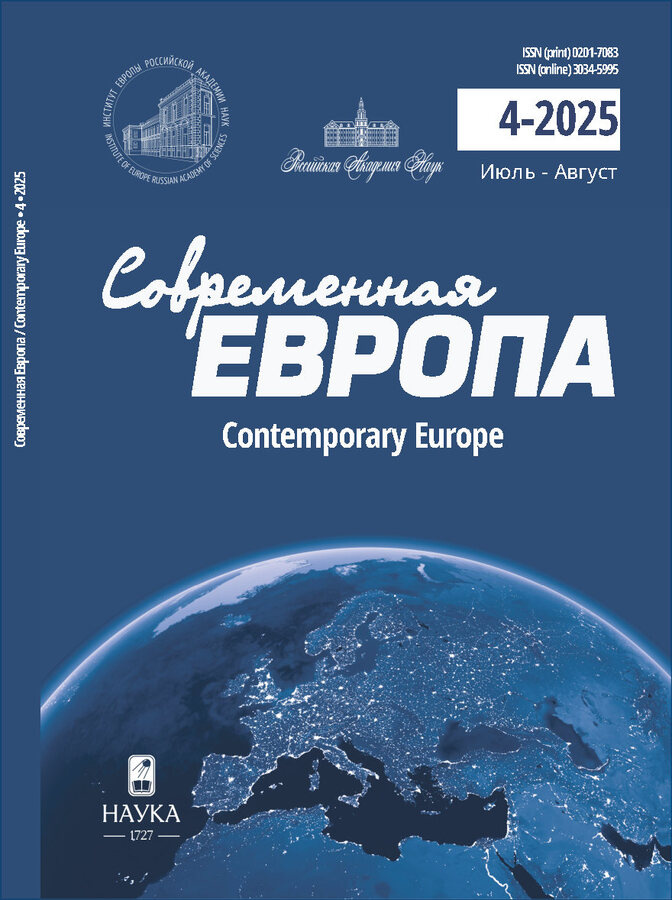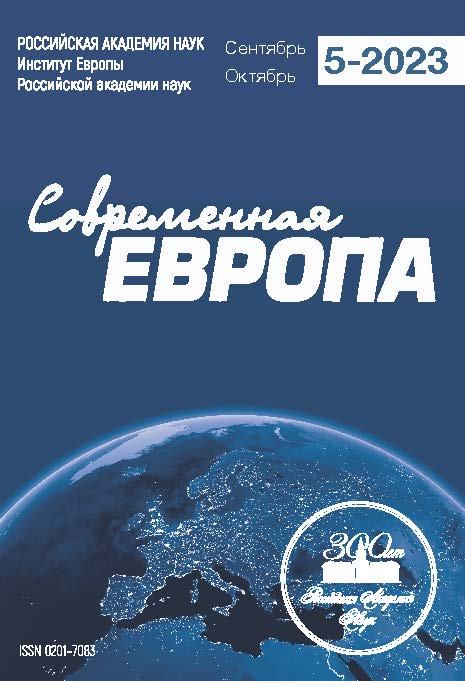№ 5 (119) (2023)
Статьи
Рубежный разворот: новая концепция внешней политики России
Аннотация
 5-17
5-17


Кризис конвергенции ценностных ориентиров Центральной Европы и Брюсселя
Аннотация
 18-30
18-30


Турция - Запад: образцовый антагонизм?
Аннотация
 31-43
31-43


Роль Британии в формировании антироссийской политики Запада
Аннотация
 44-56
44-56


Продовольственная безопасность Германии в условиях кризиса
Аннотация
 57-71
57-71


Николя Саркози и кризис Еврозоны: федерализация бюджетно-финансового сектора ЕС
Аннотация
 72-83
72-83


Дания: особенности распределения портфелей в правительстве и парламенте в сфере внешней политики
Аннотация
 84-95
84-95


Альтернативные экономические отношения в условиях санкций
Аннотация
 96-104
96-104


Политика Европейского Союза в сфере международной трудовой миграции
Аннотация
 105-118
105-118


Особенности социальной защиты при реализации права на отключение
Аннотация
 119-132
119-132


Новые религиозные движения как объект научного изучения в Италии
Аннотация
 133-146
133-146


Традиционные социальные институты в молодежной политике Румынии
Аннотация
 147-160
147-160


Kingdom of saudi arabia in the late 1920-s - early 1930-s: lessons from the soviet - british competition
Аннотация
A short, from a historical perspective, but extremely meaningful and impactful episode for the history of Russian/Soviet diplomacy in the Arab East, or rather dealing with the work of Soviet diplomats in the Kingdom of Saudi Arabia (KSA), is examined holistically in this article, following a thorough analysis of materials from the Foreign Policy Archive of the Russian Federation and the UK Foreign, Commonwealth and Development Office’s Archive, largely introduced into scholarly discourse for the first time here. The author’s attention is focused on the contest between the Soviet Union and the UK, which was still the most powerful western nation in Arabia, although the Kingdom had never been colonized, within the period - late 1920-s through early 1930-s - witnessing the emerging changes in history related to the nascent state set up by Abdul Aziz Ibn Saud. The period under review directly preceded such a most significant event for the bilateral relations as the 1932 visit to the Soviet Union by the KSA founder’s and ruler’s son - the governor of Hijaz and Foreign Minister of the KSA, Emir Faisal Ibn Abdul Aziz. It is shown that, although the British were actively using their foreign policy expertise to push back Moscow and prevent it from gaining power in the Kingdom, including through trade deals, the Soviet diplomats contrived to effectively leverage the feeling of good grace that the Saudis had for the Soviet Union, as a state that had never attempted to colonize the Arab world and had always treated the Arabs on an equal footing, which the British representatives could never afford. At the same time, the Soviet diplomats, like the British, but to a lesser degree, committed mistakes in assessing the situation and in reacting to its developments, thus useful lessons can be drawn for the modern times.
 161-177
161-177


Россия и Япония: начало трудного пути
Аннотация
 178-189
178-189


Латвия и Эстония: советский период экономического развития
Аннотация
 190-200
190-200


А.А. Громыко и политика безопасности: стратегический проект разрядки
Аннотация
 201-210
201-210


Модель «мягкого» и «жесткого» евроскептицизма: Эстонский кейс
Аннотация
 211-219
211-219













